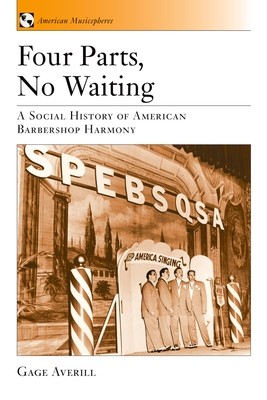
- We will send in 10–14 business days.
- Author: Gage Averill
- Publisher: Oxford University Press, USA
- ISBN-10: 0195328930
- ISBN-13: 9780195328936
- Format: 15.2 x 22.9 x 1.5 cm, softcover
- Language: English
- SAVE -10% with code: EXTRA
Reviews
Description
Four Parts, No Waiting investigates the role that vernacular, barbershop-style close harmony has played in American musical history, in American life, and in the American imagination. Starting with a discussion of the first craze for Austrian four-part close harmony in the 1830s, Averill traces the popularity of this musical form in minstrel shows, black recreational singing, vaudeville, early recordings, and in the barbershop revival of the 1930s. In his exploration of barbershop, Averill uncovers a rich musical tradition--a hybrid of black and white cultural forms, practiced by amateurs, and part of a mythologized vision of small-town American life. Barbershop harmony played a central -- and overlooked -- role in the panorama of American music. Averill demonstrates that the barbershop revival was part of a depression-era neo-Victorian revival, spurred on by insecurities of economic and social change. Contemporary barbershop singing turns this nostalgic vision into livedexperience. Arguing that the "old songs" function as repositories of idealized social memory, Averill reveals ideologies of gender, race, and class. This engagingly-written, often funny book critiques the nostalgic myths (especially racial myths) that have surrounded the barbershop revival, but also celebrates the civic-minded, participatory spirit of barbershop harmony. The contents of the CD have been replaced by a companion website with helpful links, resources, and audio examples.
EXTRA 10 % discount with code: EXTRA
The promotion ends in 19d.18:10:25
The discount code is valid when purchasing from 10 €. Discounts do not stack.
- Author: Gage Averill
- Publisher: Oxford University Press, USA
- ISBN-10: 0195328930
- ISBN-13: 9780195328936
- Format: 15.2 x 22.9 x 1.5 cm, softcover
- Language: English English
experience. Arguing that the "old songs" function as repositories of idealized social memory, Averill reveals ideologies of gender, race, and class. This engagingly-written, often funny book critiques the nostalgic myths (especially racial myths) that have surrounded the barbershop revival, but also celebrates the civic-minded, participatory spirit of barbershop harmony. The contents of the CD have been replaced by a companion website with helpful links, resources, and audio examples.


Reviews